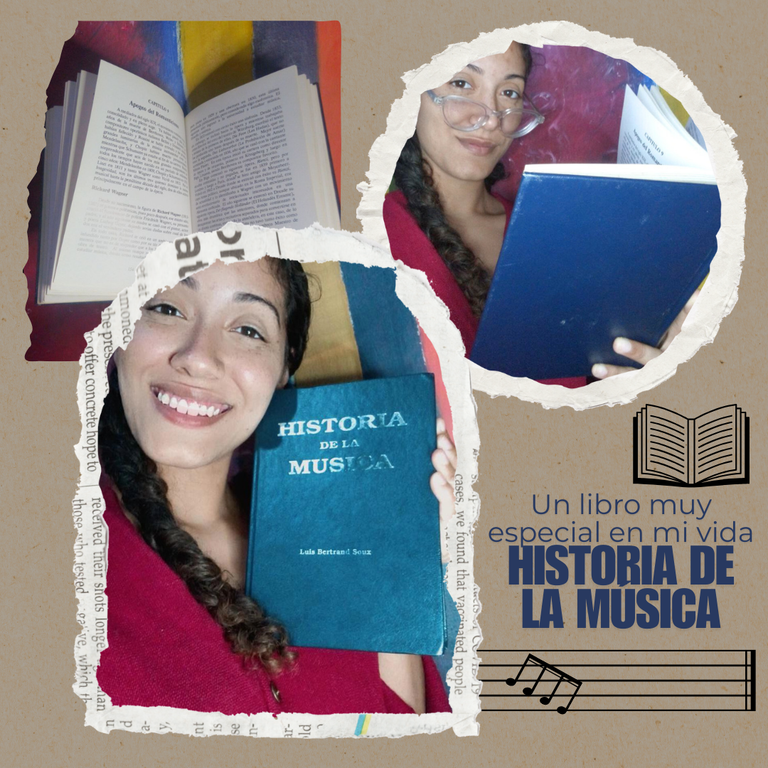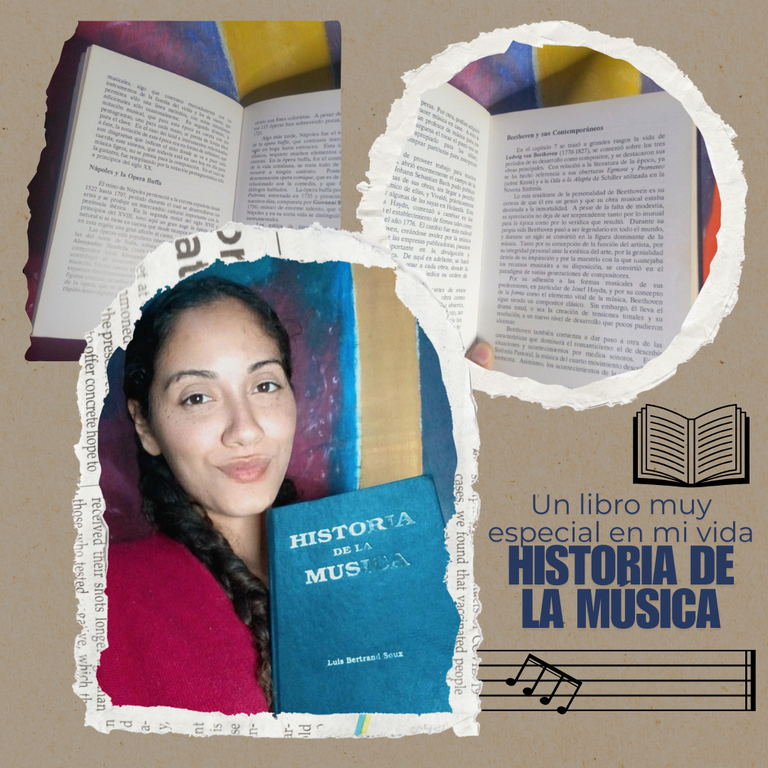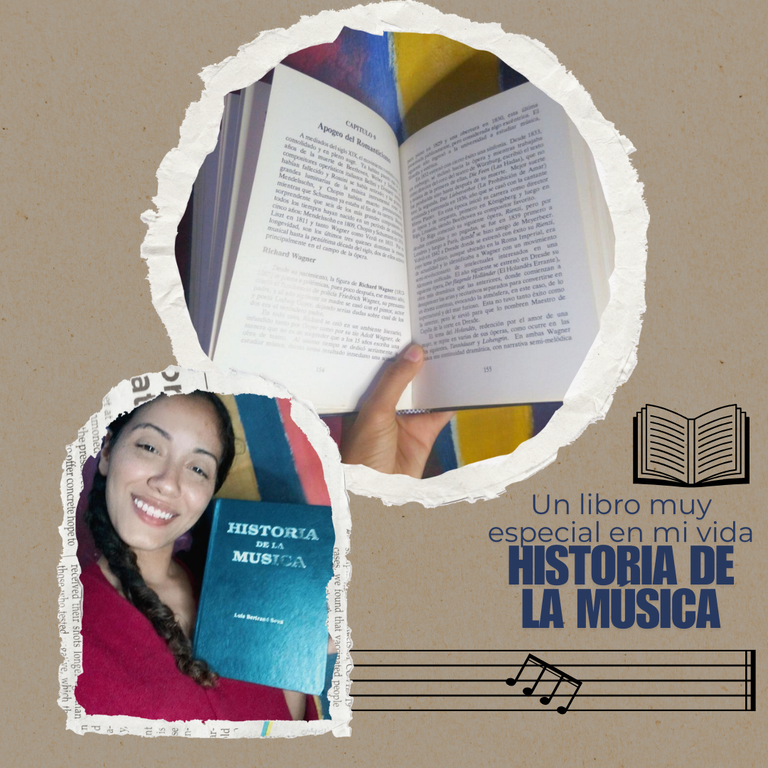Blessings my dear Hivers, it’s been a long time since I shared literature 📘 I bring you a story about one of the most special books I have in my collection! 🎵 It’s called History of Music and, honestly, it has given me a musical and literary journey like few books have ever done. I’ll tell you that this book has a peculiar story 😅 it’s not technically mine, but a friend lent it to me years ago when we were both studying music. I was thinking of returning it quickly, but, well, life happened, my friend never remembered to look for it and here it is, like a jewel on my shelf. I don’t know if it was on purpose, but I feel like he gave it to me as a gift and, even so, I always think about returning it to him someday. 😁 This book is special for several reasons. First, it doesn’t have a chronological order or strict rules on how to read it; you can start with the chapter that provokes you. It’s like a musical encyclopedia that gives you freedom, and I love it because you can dive into any time period or topic you want without feeling like you missed out on anything. 💘 One of the first topics that caught my attention was music in ancient Greece, and of course, this goes way beyond playing instruments. The Greeks saw music as something sacred and vital to their philosophy. Imagine, for them, music influenced behavior and was a part of their education; they even had a god, Apollo, dedicated to it. They talked about the “harmony of the spheres,” the idea that music could reflect the order of the universe. Crazy spectacular, my dear!
Bendiciones mis queridos Hivers, ya hace mucho desde que no comparto literatura 📘 ¡les traigo una historia sobre uno de los libros más especiales que tengo en mi colección! 🎵 Se llama Historia de la Música y, honestamente, me ha dado un viaje musical y literario como pocos libros han hecho. Les cuento que este libro tiene una historia peculiar 😅 no es técnicamente mío, sino que un amigo me lo prestó hace años cuando ambos estábamos estudiando música. Yo pensaba devolvérselo rápido, pero, bueno, la vida pasó, mi amigo nunca se acordó de buscarlo y aquí está, como una joya en mi estantería. No sé si fue a propósito, pero siento que me lo regaló y, aun así, siempre pienso en devolvérselo algún día. 😁 Este libro es especial por varias cosas. Primero, no tiene un orden cronológico ni reglas estrictas de cómo leerlo; puedes empezar por el capítulo que te provoque. Es como una enciclopedia musical que te da libertad, y a mí me encanta porque puedes sumergirte en la época o en el tema que quieras sin sentir que te perdiste de algo. 💘 Uno de los primeros temas que me atrapó fue la música en la Grecia antigua, y, claro, esto va mucho más allá de tocar instrumentos. Los griegos veían la música como algo sagrado y vital en su filosofía. Imagínate, para ellos, la música influía en el comportamiento y era una parte de su educación; hasta le tenían un dios, Apolo, dedicado a ella. Hablaban de la “armonía de las esferas”, la idea de que la música podía reflejar el orden del universo. ¡Una locura de espectacular mis queridos!

The book then takes us to the Middle Ages, where Christianity takes center stage with Gregorian chant. This is where something more organized begins to appear, the melodies were simple, but so powerful that monks sang them to connect with the divine. Also, at that time the famous "neumes" emerged, the first attempts at musical notation (imagine a kind of precursor to the pentagram). 🎼 These chants did not have the rhythms or harmonies of today, but they laid a foundation that would expand over time, especially when they began to experiment with polyphony, that is, the combination of several voices in harmony. Imagine how revolutionary that must have been back then... And speaking of revolution, we come to the Renaissance. Here the book explores how music begins to have a more creative role. Schools such as those of Burgundy and Spain appear, with freer and less religious forms. The madrigal emerges, which is a very popular poetic-musical form at the time, and a more human and emotional approach to music begins to be seen. This builds up to the Baroque, one of my favourite periods. The book talks about the birth of opera, no less! 😍 Opera buffa, in particular, is one of my weaknesses; with its comic and everyday themes, it represented something that people could enjoy in their language and culture. Then there's instrumental and keyboard music flourishing in places like Naples, while in France, Louis XIV was giving a good push to musical development.
El libro luego nos lleva a la Edad Media, donde el cristianismo toma protagonismo con el canto gregoriano. Aquí es donde empieza a aparecer algo más organizado, las melodías eran simples, pero tan poderosas que los monjes las cantaban para conectar con lo divino. Además, en esa época surgieron los famosos "neumas", los primeros intentos de notación musical (imaginen una especie de precursor del pentagrama). 🎼 Estos cantos no tenían los ritmos ni las armonías de hoy, pero ponían una base que se expandiría con el tiempo, especialmente cuando empezaron a experimentar con la polifonía, es decir, la combinación de varias voces en armonía. Imaginen lo revolucionario que debió ser eso en ese entonces... Y hablando de revolución, llegamos al Renacimiento. Aquí el libro explora cómo la música empieza a tener un papel más creativo. Aparecen escuelas como la de Borgoña y España, con formas más libres y menos religiosas. Surge el madrigal, que es una forma poética-musical muy popular en la época, y se comienza a ver un enfoque más humano y emocional en la música. Esto se va haciendo cada vez más intenso hasta llegar al Barroco, uno de mis periodos favoritos. El libro habla del nacimiento de la ópera, ¡nada más y nada menos! 😍 La ópera bufa, en particular, es una de mis debilidades; con sus temas cómicos y cotidianos, representaba algo que la gente podía disfrutar en su idioma y en su cultura. Además, tenemos la música instrumental y de teclado que florece en lugares como Nápoles, mientras en Francia, Luis XIV daba un buen empujón al desarrollo musical.

In the Classical period, figures such as Haydn, Mozart and Beethoven entered the arena. The sonata and the concerto became stronger during this period. The incredible thing is to see how music also became a means of expressing philosophical and even political ideas, influenced by the Enlightenment and by changes as great as the French Revolution. Here the book shows you how each composer had his own style, but all sought to perfect the forms and express emotions that until then had not been explored. Beethoven, with his intense life and profound works, is an example of this, being a bridge between Classicism and Romanticism. ♫ 𝄞 ♬ Romanticism is another journey. Here musicians overflow with passion. Composers such as Wagner and Verdi revolutionize opera with dramatic emotions, while pianists such as Chopin and Liszt become keyboard legends. Here there is a notable change, because it is no longer just about technical perfection, but about expressing the deepest emotions. Music becomes something completely personal and sometimes even tragic. ♭ ♪ ♩ ... The book takes us into the 20th century, where sounds change in an impressive way. Nationalism appears, with composers like Tchaikovsky in Russia and the famous "Russian Five", who are inspired by the traditions of their land to create unique works. We also see how America and Latin America begin to be part of the world music scene. In the last section, electronic music is mentioned and the influence it would have on the new generations. And to think that it started out as something so simple and primitive in ancient Greece! ♮ 🎤 🎻
Ya en el Clasicismo, entran al ruedo figuras como Haydn, Mozart y Beethoven. En esta época se fortalece la sonata y el concierto. Lo increíble es ver cómo la música también se vuelve un medio para expresar ideas filosóficas e incluso políticas, influenciada por la Ilustración y por cambios tan grandes como la Revolución Francesa. Aquí el libro te muestra cómo cada compositor tenía su propio estilo, pero todos buscaban perfeccionar las formas y expresar emociones que hasta ese entonces no habían explorado. Beethoven, con su vida tan intensa y obras profundas, es un ejemplo de esto, siendo un puente entre el Clasicismo y el Romanticismo. ♫ 𝄞 ♬ El Romanticismo es otro viaje. Aquí los músicos se desbordan en pasión. Compositores como Wagner y Verdi revolucionan la ópera con emociones dramáticas, mientras que pianistas como Chopin y Liszt se convierten en leyendas del teclado. Aquí hay un cambio notable, porque ya no solo se busca la perfección técnica, sino expresar las emociones más profundas. La música se convierte en algo completamente personal y a veces hasta trágico. ♭ ♪ ♩ ... El libro nos adentra en el siglo XX, donde los sonidos cambian de una manera impresionante. Aparece el nacionalismo, con compositores como Tchaikovsky en Rusia y los famosos "Cinco Rusos", quienes se inspiran en las tradiciones de su tierra para crear obras únicas. También vemos cómo América y Latinoamérica empiezan a ser parte de la escena musical mundial. En el último tramo, se menciona la música electrónica y la influencia que tendría sobre las nuevas generaciones. ¡Y pensar que empezó siendo algo tan sencillo y primitivo en la Grecia antigua! ♮ 🎤 🎻

... This book is a real gem. Every time I pick it up, I feel like I'm transported back in time. I'm not exaggerating when I say that my friend gave me a priceless gift, even if that wasn't his intention when he lent it to me. If you get the chance, read Luis Bertrand Soux's History of Music 📘 I'm sure those who love music and its history will be fascinated.
... Este libro es una verdadera joya. Cada vez que lo agarro, siento que me transporta en el tiempo. No exagero cuando digo que mi amigo me hizo un regalo invaluable, aunque no fuera su intención al prestármelo. Si tienen la oportunidad, lean Historia de la Música de Luis Bertrand Soux 📘 estoy segura de que quienes aman la música y su historia quedarán fascinados.
